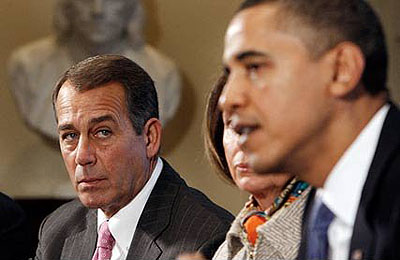Andrew Sprung is frustrated that John Boehner is getting some mainstream traction for his sob story about how he tried really, really hard to accomodate President Obama in the fiscal cliff negotiations, but Obama  was just a brick wall who treated everything like it was his way or the highway:
was just a brick wall who treated everything like it was his way or the highway:
In truth, Obama in the course of grand bargain negotiations reduced his never-enough ten-year revenue targets from $1.6 to 1.4 to 1.2 trillion, raised the threshold for income tax rate hikes from his long-sought $250k/household to $400k (ultimately $450k), put chained-CPI on the table as a means of slowing Social Security spending, and proposed some $600 billion in Medicare spending cuts over ten years — to which Boehner responded by blowing up the negotiations with his ridiculous Plan B.
Andrew has much more on this, but at heart I think it’s a demonstration of how reporters too often let tales of personal intrigue trump objective facts. Because in this case, the objective facts are really pretty clear. Boehner never once put forward a detailed plan, while Obama did repeatedly. And as Andrew says, Obama’s position moved in Boehner’s direction every time, with his revenue ask going down and his spending cuts going up.
In the end, though, Boehner just couldn’t make a deal. This isn’t because Obama was an arrogant bastard who never tried to understand their differences, it’s because a majority of Boehner’s caucus simply wasn’t willing to agree to a tax hike of any kind and Boehner wasn’t willing to back a plan that didn’t have majority GOP support. There’s really not much more to it than that. Boehner and Obama may well be tired of each other, but that’s not why their negotiations routinely fall apart. It’s because Boehner has no control over his own caucus.

















